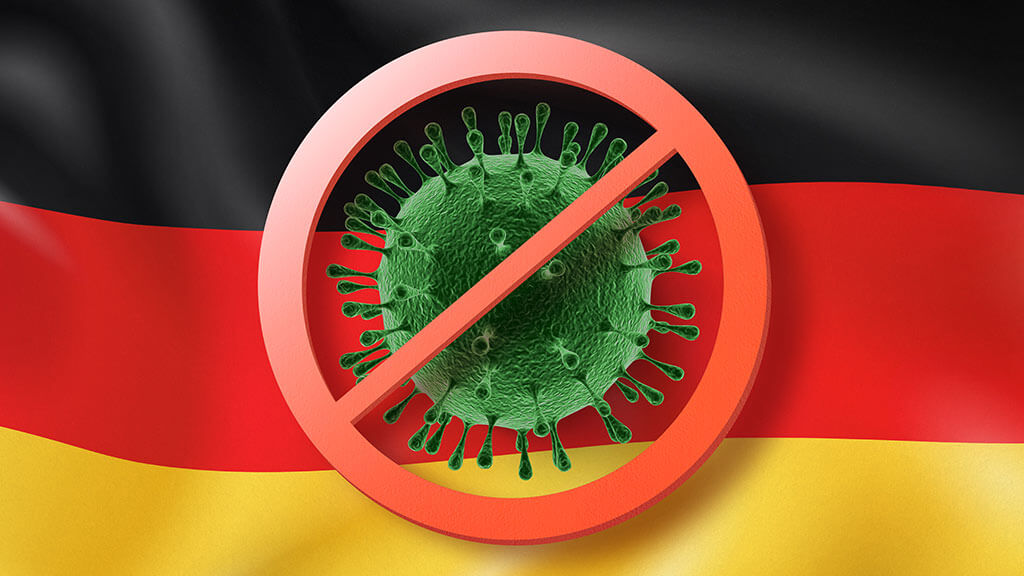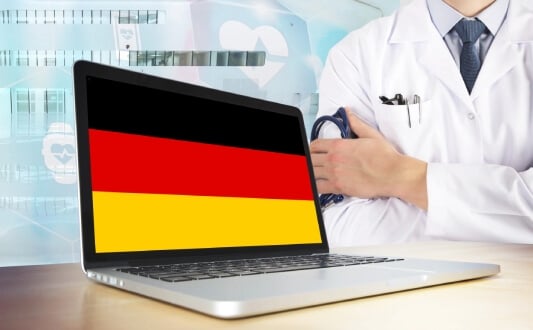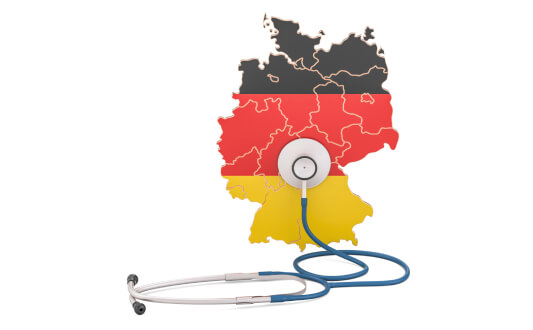Due to the COVID-19 epidemic, the attention of the global medical community is aimed at preventing the spreading of infection and developing treatment methods. At the same time, the most effective models of health care systems, which allow for achieving high recovery rates, are studied. Today, Germany is the undisputed leader in this sphere. According to statistics on the coronavirus spreading, Germany ranks 5th in terms of infected people (more than 67,000 people). Nevertheless, mortality does not exceed 0.9% (with an average global rate of 4.8%).
Content
- Early testing and high quality diagnostics
- Modern medical equipment
- Sustainable quarantine measures
- General health level of the nation
- Perspectives for the treatment of coronavirus
Early testing and high quality diagnostics
Germany is the first country where the express-testing for coronavirus has become maximally accessible to the population. The following people can undergo testing for the coronavirus:
- All people with the symptoms of acute respiratory viral infection (body temperature above 38.0°C, cough, shortness of breath)
- People who have been in contact with infected patients
- People who had come back from countries with high infection rates
According to the Robert Koch Institut, about 12,000 tests are carried out in the country daily. This is possible due to reprofiling of laboratories and medical personnel training in working with coronavirus tests. Mass testing for coronavirus in Germany began in January when the number of cases was quite low. Researchers from the Charite University Hospital were among the first developers of this specific test.
The industrial level of Germany also played an important role. The production of test systems, protective equipment for medical personnel and population, as well as other medical products was quickly deployed here. Currently, the country uses two types of tests:
- Express-tests with the determination of antiviral antibodies in the blood. The test allows doctors to obtain the result in 10 minutes, but it becomes positive only 5-7 days after infection and requires mandatory confirmation using a PCR test.
PCR tests with searching for the virus in smears obtained from the nasal mucosa. Polymerase chain reaction (PCR) allows doctors to detect viral DNA or RNA immediately after infection, even before antibody production starts. Taking into account the complexity of work with nucleic acids, PCR tests are carried out in specialized laboratories.
Modern medical equipment
The low mortality rate in Germany is also directly related to the availability of modern medical equipment and adequately equipped medical facilities. As of the beginning of March 2020, there were 25,000 beds in intensive care units with the possibility of mechanical lung ventilation. These indicators significantly exceeded the number of Intensive Care Units in other European countries. So, Italy had about 5,000 beds, and about 7,000 ones were available in France.
Despite the fact that the hospitals are prepared to admit a large number of patients in serious condition (25,000 mechanical ventilation systems for 33,000 infected patients, while most of these patients have a mild clinical course of the disease), Germany takes additional preventive measures. Thus, as of the end of March 2020, it is planned to purchase another 10,000 mechanical ventilation systems, and the doctors will undergo additional training in working with them.
In order to avoid overcrowding in hospitals, the departments of the therapeutic profile (for example, gastroenterological, cardiological, and neurological ones) are partially reconstructed to provide medical care to patients with coronavirus infection. For temporary admission of patients with a mild form of the disease, it is planned to use medically equipped hotels (if necessary).
Sustainable quarantine measures
The Departments of Infectious Epidemiology, Epidemiology and Health Monitoring, as well as Infectious Diseases at the Robert Koch Institut, are constantly developing and improving local measures for the prevention of the coronavirus infection. German experts also use recommendations that are based on the experience of virologists and epidemiologists from China.
The main quarantine measures at the federal and state levels include the following:
- Maintaining social distance, using masks and antiseptics, avoiding contact with older people
- Canceling public events
- Remote education at schools and universities, closing preschool institutions.
- Remote work of enterprises (where it is possible)
- Strict safety requirements for healthcare workers, additional prevention of nosocomial infections
- Provision of the population with food and medicines
- Reasonable maintenance of economic activities in order to mitigate the economic impact of the epidemic
It is emphasized that all restrictions are temporary and are aimed solely at saving human lives.
In the video message, Chancellor of Germany Angela Merkel emphasizes the importance of curbing the spread of the virus due to the lack of specific treatment or prevention measures. At the same time, the recommendations of the government must be transparent and understandable so that everyone can assess their benefits and strictly adhere to them. Angela Merkel urges the nation to cooperate to overcome the epidemiological crisis more quickly. The actions of the German government are clearly coordinated and aimed at minimizing the economic, social, and cultural damage from the epidemic.
General health level of the nation
Italy and Germany are the two European countries with the highest percentage of the population over the age of 65 (this is the age category, which is most vulnerable to coronavirus). Moreover, the epidemic in Germany has begun with the infection of young people who have visited ski resorts in Italy and Austria. According to the Robert Koch Institut, up to 70% of infected people were between the ages of 20 and 50 years.
Nevertheless, a generally high level of health in Germany contributes to an easier course of the disease, even in patients from the older age group. This is due to regular medical check-ups (preventive examinations), the availability of high-tech medical care, and the regular review of treatment protocols with the inclusion of innovative drugs.
For example, statistics on cardiovascular diseases demonstrate the highest number of performed surgeries for coronary artery bypass grafting in comparison with other European countries and, consequently, high rates of coronary artery disease compensation.
Germany also demonstrates high efficacy in the treatment of patients with diabetes mellitus who are at high risk for coronavirus infection. According to the World Health Organization, diabetes mellitus types 1 and 2 were diagnosed in 7.4% of the German population, while more than 70% of them maintain the disease in a state of compensation.
Perspectives for the treatment of coronavirus
At the moment, German experts, along with the leading virologists from all over the world, carry out research in two fields:
- Development of treatment protocols for coronavirus infection depending on the severity of symptoms, including coronavirus pneumonia
- Development of a vaccine for the immunological prophylaxis of coronavirus infection and facilitation of the recovery process
Over 3,000 patients from Germany, France, Spain, the UK, and other countries will take part in the ongoing "Discovery" research. The objective of the research is to determine the effectiveness of drugs for coronavirus, which are available on the pharmaceutical market. During the research, the patients will receive treatment according to the following five protocols:
- Standard treatment
- Standard treatment in combination with the synthetic antiviral drug GS-5734 (Remdesivir)
- Standard treatment in combination with the combined antiviral drug Lopinavir + Ritonavir
- Standard treatment in combination with the combined antiviral drug Lopinavir + Ritonavir and Interferon beta
- Standard treatment in combination with synthetic antiprotozoal drug hydroxychloroquine
The patients in German hospitals receive standard and symptomatic therapy until the efficacy and safety of the antiviral or antimalarial treatment protocols are confirmed. After publishing the results of the "Discovery" research, Germany is going to take part in the next large-scale clinical research – "Solidarity," which will be carried out under the patronage of WHO.
Choose treatment abroad and you will for sure get the best results!
Authors:
This article was edited by medical experts, board-certified doctors Dr. Nadezhda Ivanisova, and Dr. Bohdan Mykhalniuk. For the treatment of the conditions referred to in the article, you must consult a doctor; the information in the article is not intended for self-medication!
Our editorial policy, which details our commitment to accuracy and transparency, is available here. Click this link to review our policies.
Sources:
Read:
Why Booking Health - questions and answers
How to make right decision when choosing the clinic and specialist
7 reasons to trust to the rating of clinics on the Booking Health portal
Don't know where to start?
Contact Booking Health







